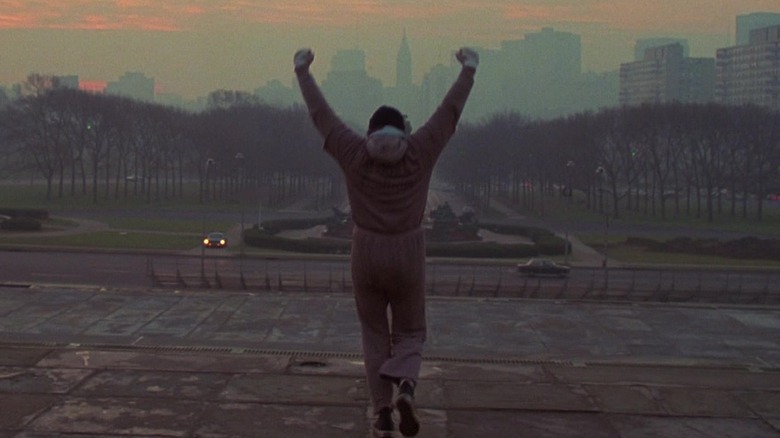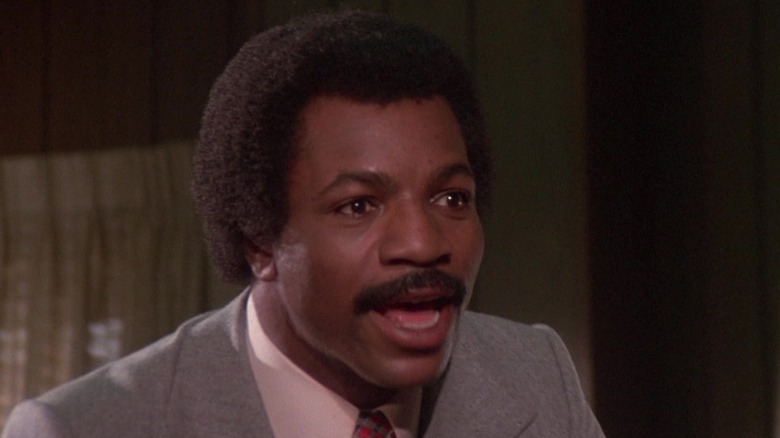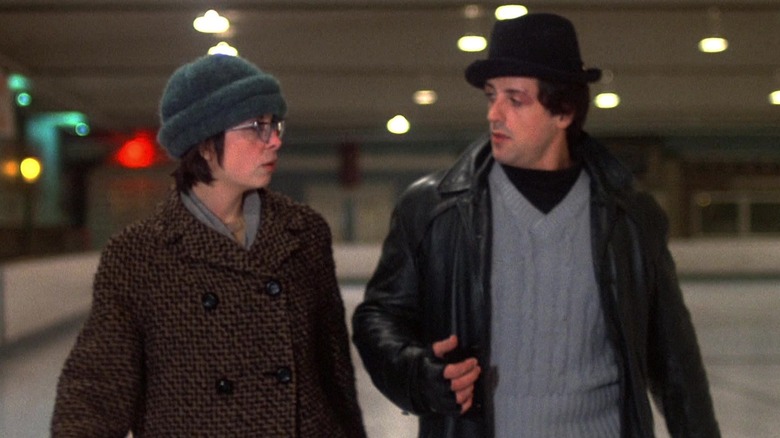Rocky's Reception Upon Release Was A Surprise For Everyone Involved
The amount of effort it takes to make a movie requires nerves of steel. You try to make it the best it can possibly be under the circumstances in which you're given. In the case of "Rocky," it not only proved itself successful at the box office in 1976, but would go on to become a critical piece of U.S. pop culture. I can't imagine walking up to someone who hasn't at least heard of the screen boxer, played ever so charmingly by Sylvester Stallone. At the time, though, the "Death Race 2000" star was going through his own underdog story when putting the script together. Stallone barely had any money to his name, in addition to nearly losing the role of Rocky Balboa to a bigger name like Robert Redford.
This gamble of front-lining a nobody to headline a project like this paid off in spades, as "Rocky" remains one of the most inspirational films ever released. However, director John G. Avildsen had originally assumed the sports drama would be a bust, as he explained to Philadelphia Magazine for its 2016 oral history about the making of the film:
"I thought it was going to be at the bottom half of a bill at some drive-in [theater] in Mississippi. But then it opened at this East Side art-house cinema on 3rd Avenue, and there was a line around the block. That's when it began to sink in."
Over four decades later, the "Rocky" franchise has gone on to amass more than $1.5 billion across six films and two spin-offs, with the next entry, "Creed III," set to hit theaters in 2023. Of course, no one working on the original "Rocky" film could have ever foreseen the series' massive success, let alone the folks who were starring in it.
The stars weren't used to getting recognized
Speaking to Philadelphia Magazine for its "Rocky" oral history, Carl Weathers talked about the positive reaction to him playing heavyweight champion Apollo Creed for the first time. "It was a kind of groundswell," he explained. Prior to "Rocky," Weathers had mostly had some bit parts in some Pam Grier movies, in addition to a TV series guest spot every now and then, but it wasn't until opening weekend where Weathers felt his first real dose of fame:
"I remember I was in New York just after the film was released. I was walking down the street in Manhattan the day before it opened, was not recognized by anyone, of course — I had done some movies and TV that hadn't done particularly well. The day after — the next day — the vendors were going, 'Yo, Apollo!' That's the power of movies."
Even though Talia Shire had more than enough exposure from "The Godfather" films, after "Rocky" came out, she was heartened by the folks who had approached her, notably the shy women who saw themselves through Adrian. "They're the women nobody gets up and gives up their seat for," said Shire. "That has great meaning."
Getting recognized in a contemporary era, as compared to '76, was a wildly different ball game. The internet has basically given the public accessibility to interact with their favorite stars across social media at any given time, for better or worse. The chances of seeing a movie star out and about back then was pretty slim, and the "Rocky" crew took their newfound fame in stride. Given how impactful the boxing drama became, it was no wonder why folks flocked to see them.
One review set the tone
If you were moved by Rocky's ascension up the museum stairs, then you partly have camera operator Garrett Brown to thank. The Philly native is the person responsible for inventing the Steadicam, and "Rocky" was one of the first films to utilize it. Even after giving life to a revolutionary piece of technology, Brown didn't quite know what folks were going to make of the film. It wasn't until he saw a glowing review from The Hollywood Reporter that he recognized the movie's legacy being born. "We saw Arthur Knight's review that raved about the film, and you got a kind of chill," said Brown.
The review in question came from film critic Arthur Knight, who spoke to how the emotional tangibility of these characters paved the way for "Rocky" to become one of the greats. "On paper, neither character may seem terribly appealing, but on the screen, they steal your heart away. [...] In many ways, 'Rocky' is a picture that should make movie history," wrote Knight.
When it came time for Jack Nicholson to present the Best Picture Oscar, "Rocky" was facing some stiff competition from absolute titans of cinema like Alan J. Pakula's "All the President's Men," Sidney Lumet's "Network," and Martin Scorsese's "Taxi Driver." But that ceremony became something out of the movies, as the underdog story that captured the hearts and minds of audiences all over the world triumphed with one of the industry's greatest honors.
We sometimes look back into the past to see if a film's initial critical reception was warranted or not, but in the case of "Rocky," I think Knight was right on the money.
"Rocky" is currently streaming on Paramount+ and Netflix.


